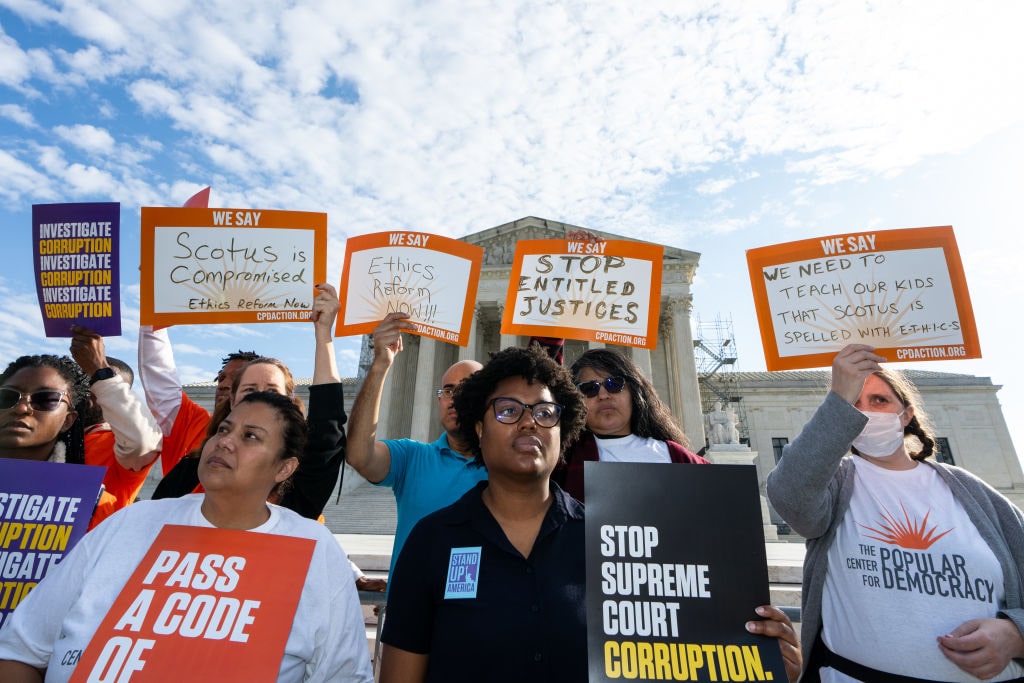In the wake of a media and Democrat-led campaign against the conservative Justices of the United States Supreme Court, the august body has, on November 13, adopted a Code of Conduct for the first time. This will not significantly impact the business of the nation’s highest court, as the Justices are already subject to ethical requirements. It does, however, codify the language of expectations and rules to which the members agree to adhere.
In a statement explaining the document, the Justices write, “The absence of a Code … has led in recent years to the misunderstanding that the Justices of this Court, unlike all other jurists in this country, regard themselves as unrestricted by any ethics rules.” The statement continues, “To dispel this misunderstanding, we are issuing this Code, which largely represents a codification of principles that we have long regarded as governing our conduct.”
 We spoke with Liberty Nation’s Legal Affairs Editor, Scott D. Cosenza, to fathom the impact of such a Code and determine what’s really behind the efforts to add an extra layer of accountability.
We spoke with Liberty Nation’s Legal Affairs Editor, Scott D. Cosenza, to fathom the impact of such a Code and determine what’s really behind the efforts to add an extra layer of accountability.
Mark Angelides: How significant is it, Scott, that the Justices felt it necessary to release a Code of Conduct?
Scott D. Cosenza: It is extraordinary. The Justices all seem interested in responding to the recent campaign that looks designed to de-legitimize the Court – including and especially at the Senate Judiciary Committee.
MA: For the last year, the media has been calling for the head of Justice Clarence Thomas because of his friendship with billionaire Harlan Crow. Does anything in this 15-page document present any implications for Thomas?
SDC: I don’t think so. The Code of Conduct for Supreme Court Justices says they will follow the gift-giving rules established for all lower federal court jurists from the Judicial Conference of the United States. That body comprises all the most senior judges in the various federal courts and is regarded as non-partisan and non-ideological.
MA: Perhaps more importantly, did Thomas do anything wrong in the first place?
SDC: Justice Thomas did nothing illegal. That much is clear. Is it wrong for a Justice to accept ultra-luxurious accommodations? I don’t think so, provided the friendship is genuine and the accommodations weren’t selected to benefit the Justice. Even Thomas’ detractors say he and Mr. Crow are friends, and that Mr. Crow didn’t buy a yacht and a house especially to host the Justice. Personal hospitality naturally tracks with the spending lifestyle of the giver. If Crow had a houseboat and a condo in Ocean City, one presumes the Justice would have visited him there instead of the luxurious alternatives the billionaire affords himself.

(Bill Clark/CQ-Roll Call, Inc via Getty Images)
However, Justice Thomas may have had all or most of a $267,000 motorcoach paid for by a different billionaire friend. This kind of lavish gift is a different sort of problem. While legal, this looks more like someone offering outsized goodies to a Justice simply because they are a Justice. The chance that a billionaire’s interests may be impacted by Court action is much more likely and more challenging to ascertain than a person with a few stocks and properties. There has been no specific charge of conflict regarding Thomas and any of his rich pals that I am aware of.
MA: This certainly seems like a concession to members of Congress who have been pushing for a “dilution” of the conservative influence on the Court, packing it with liberals essentially. Just this week, Senator Dick Durbin (D-IL) stopped short of using his position as chairman of the Senate Judiciary Committee to issue subpoenas for Justice Thomas. What stopped him, and what did he hope to achieve by dragging the Justice in for questioning?
SDC: Committee member Marsha Blackburn (R-TN) seemed to stop him cold, with threats of subpoenaing left-leaning Justice Sonia Sotomayor’s staff and book publishing associates. She said she would go after Jeffrey Epstein’s Lolita Express flight logs, too.
MA: Do you think the Code of Conduct will mollify Senator Durbin?
SDC: I think we shall see the opposite reaction by Durbin and his most enthusiastic partner, Sen. Sheldon Whitehouse (D-RI). Now that the Code has been published, how do you apply it? Who will investigate alleged breaches? Well, Congress, naturally, and the Senate Judiciary Committee members, I suspect, feel they are exceptionally well suited to the task. Whitehouse said as much after the Code was reported and called it merely the “first step.”
MA: What amazes me, Scott, is that the papers are plastered with stories about Justice Thomas and his supposed ethical issues, and yet hardly a word has printed or spoken about Justice Sotomayor’s flagrant misuse of taxpayer resources. Could you briefly describe what happened and let us know if anything in this new Code would prevent such abuse in the future?
SDC: Justice Sotomayor has been accused of using her taxpayer-funded court staff to manage the delivery and shipping of books she sold. Much worse, her staff appeared to apply heavy-handed sales pressures to those hosting Sotomayor for speaking engagements regarding books. The Justice has made millions of dollars as an author since her nomination to the Supreme Court. She was not a paid author before then. The way the Justice is said to use her staff seems prohibited under the newly published Code as well as longstanding rules already in place when the behavior occurred.
MA: Scott, what are the more far-reaching ramifications of the current Justices signing this pledge? Does it bind future Justices to the same rules? And, I think, more importantly, does codifying conduct in this way leave open a possibility that one of the other co-equal branches of government could gain oversight of the Supreme Court?
SDC: Anyone who claims to know the answer is writing a check you can’t cash. It’s hard to understand how this has any bearing on future Justices, with one exception: creating an overwhelming pressure wave for them to sign on, too. We will see senators grill nominees to the Court on this now – and ask them if they will agree. That much is sure, but little else here is. I hope I live long enough to read the historical accounts of those there when this Code was discussed and debated.

